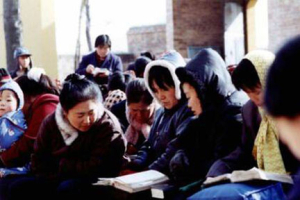In recent months, China officials and civil institutions in China have begun discussions and researches on the problem of the registration of house churches, says a Chinese scholar, and different individuals have inclined to support the approval of house church registration with the government, which would give them a legal status, and they’ve pointed out that this approach will benefit the harmonizing of the society.
In the bulletin of Alliance Bible Seminary Christianity and China Cultural Research Center, Dr. Kwok Wai-luen posted an article titled “Legalization and Social Harmony: Recent Discussions in Mainland on the Registration of House Churches”, in which the author referred to the two to three scholastic seminars hosted by both government and various scholastic research institutions held within the last year. Some have expressed their opinions that it is a general course of development where the house churches would be able to register with the government.
Kwok brought up several seminars: “Religion and Law – Legal System and Religion in Harmonious Society”, which was hosted by Chinese Academy of Social Sciences Institute of World Religions and co-hosted by U.S. based academic institutions, held from end of May till beginning of June; “Beijing Summit on Chinese Spirituality and Society at Peking University”, which was organized by Center on Religion and Chinese Society at Purdue University, the Center for the Studies of Chinese Religion and Society at Peking University, and the Institute for the Studies of Buddhism and Theories of Religion at Renmin University, held from Oct. 8-10.
In November, General Office of the CPPCC National Committee and International Department Central Committee of CPC hosted and Chinese Academy of Social Sciences Institute of World Religions co-hosted the scholastic seminar “The Effects and Influences of Religion of Christianity in Modern China Society.”
Within the same month, Beijing Pacific Solutions Social Science Research Institute, Minorities Development Research Institute hosted a special topic seminar titled "Christianity and Harmonious Society Seminar – Chinese House Church Symposium.”
From December 11-13, Institute of World Religion Christianity Research Center hosted another seminar titled “Christian Religion and Social Transformation”, discussing the topics of “The Problems of Today’s China House Churches Becoming Socialized.”
In the series of scholastic seminars, Kwok noticed that various individuals approve of the registration of House Church and they said that this approach will benefit the country and the society.
At the Beijing Summit held at Peking University from Oct. 8-10, Yu Jianrong, director of Chinese Academy of Social Sciences Research Center, said that the government should face the reality of the rapid growth of house churches within China’s society, instead of taking the “Ostrich Approach” at a panel on “The Current Status and Future of Christian House Churches.”
“They should be allowed to become recognized publically and they must be freed from the ‘sensitivity’,” he said, “Or else the consequences of keeping them in the dark will produce cults and evil sects.”
Other Chinese scholars also voiced similar observations and provided their input on how to tackle this problem and addressed some concerns.
Dr. Gao Shining, who is a research Associate, the Institute of World Religions, Chinese Academy of Social Sciences, Beijing, also expressed support for the public recognition of house churches. She thinks that since house churches will eventually mature in the gathering contents, size, and leadership qualities, if they can enter the public square to care and serve the society, then the problem of legalization can be resolved gradually.
Dr. Liu Peng, founder of Pacific Solutions Social Science Research Institute and a research fellow at the Institute of American Studies, Chinese Academy of Social Sciences, said that the government should view the issue of house churches as a regular, non-political, spiritual-needs problem involving the public interests of a large group of people, rather than a political or western imperialistic problem. In this way, the house church registration problem can be more easily resolved.
Li Xianping, professor and director of the Center for Religious & Social Research, Shanghai University, pointed out that “changing the direct political interference with religion and allowing house churches to have a legal status and public recognition will effectively move the country onto the right track of exercising its authority.”
Kwok wrote that “It is unlikely that the house church registration will be approved soon, however, it should be the direction for the development of China’s religious policies - the reality of house churches forces the government to search for a more effective method of management.”
He further pointed out that the government may be particularly concerned over whether the registration of house churches will threaten the existence of the current government-sanctioned churches or it will become a floodgate of the people’s social petitions.
In addressing the first concern, Kwok referred to the history of the Anglican Church in England.
“Tolerance on religious policies will not cause a state-church to be destroyed, but it will be advantageous for the government to manage different types of churches, and promote for self-reform,” he said.
For the second possible concern that Chinese authorities may have, Kwok said that house church leaders generally advocate the separation of church and state, actively support the protection of the social harmony and stability, and those who register with the government mostly accepts a gradual rather than a revolutionary reform. He believes that the government should be keen about the people’s petition for their rights, provide judicious guidance according to the circumstances, and promote for gradual changes.
In conclusion, Kwok believes that in the long-run allowing the house churches to register should be the goal and strategy for achieving “social harmony.”
Reporter Sharon Chan contributed to this report.

















